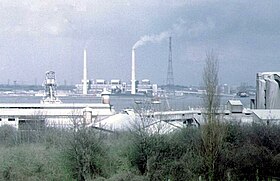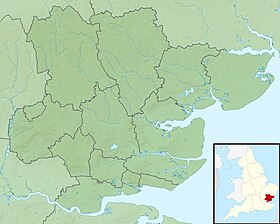West Thurrock Power Station
| West Thurrock Power Station | |
|---|---|

West Thurrock Power Station, 1973.
|
|
| Country | England |
| Location | Essex, East of England |
| Coordinates | 51°28′10″N 0°17′20″E / 51.469573°N 0.288756°ECoordinates: 51°28′10″N 0°17′20″E / 51.469573°N 0.288756°E |
| Commission date | 1962 |
| Decommission date | 1993 |
| Operator(s) | CEGB |
| Thermal power station | |
| Primary fuel | Coal-fired |
| grid reference TQ589770 | |
West Thurrock Power Station was a coal-fired power station on the River Thames at Stone Ness, West Thurrock in Essex. The station was close to the northern end of the 400 kV Thames Crossing of the National Grid.
The station was built by the Central Electricity Generating Board and unlike most of the power stations further up the Thames, West Thurrock was built in the 1950s and on a green field site. Construction, which included the piling and landfilling of the marshy riverside, took several years; starting in 1957 until it was opened in 1962. The station had two 175 m (574 ft) tall chimneys made from reinforced concrete. Later conversion work allowed the station to burn oil and natural gas as well as coal.
After the UK's electric supply industry was privatised in 1989, it was operated by National Power. In 1992, one of the station's units were decommissioned. The station's other four units were decommissioned in 1993. The closure left a stockpile of nearly half a million tonnes of coal, which was transported downstream to the nearby Tilbury Power Station by Rhine barge.
After demolition part of the site was redeveloped as a works making industrial chemicals for the adjacent Procter & Gamble works and utilising the former coaling jetty. A proposal to build a large postal sorting office on the former fly-ash lagoons proved controversial due to the wildlife that had colonised the site.
...
Wikipedia

